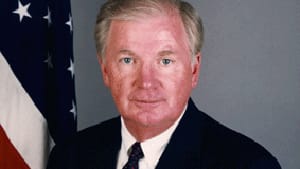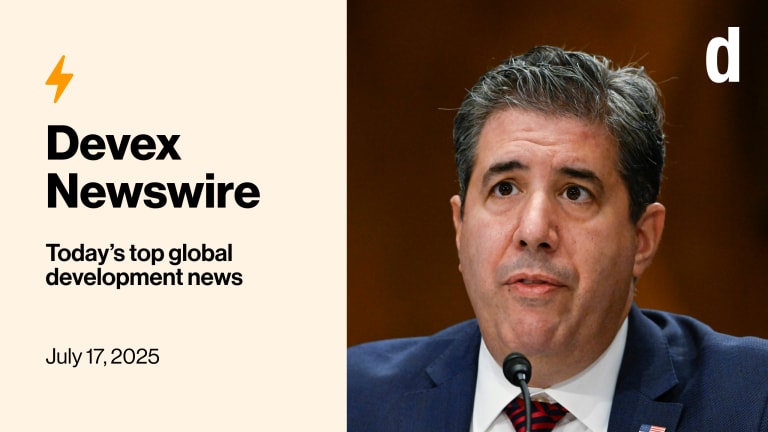
WASHINGTON — Questions about United Nations peacekeeping reform, funding for the U.N. Population Fund, and the global compact on migration were all put to Kevin Moley Tuesday in his nomination hearing for the post of assistant secretary of state for international organization affairs.
Moley previously served as the ambassador to the U.S. Mission to the United Nations in Geneva, in a variety of other government posts, and was the chair of the board of Project Concern International.
“My guiding principle if I am confirmed to lead IO will be America first but not alone,” Moley said, adding that means that at the U.N., in New York, the U.S. will use its veto when necessary to protect its interests and it will be vigilant in Geneva and elsewhere to protect U.S. interests.
Early in the hearing Moley was asked by Sen. Todd Young, a Republican from Indiana, who chaired the hearing about what he sees as the top priority when it comes to U.N. peacekeeping reform.
“U.N. peacekeeping reform is a very important priority for Ambassador [Nikki] Haley, and if confirmed, for all of us working in IO,” he said. There are more than 100,000 U.N. peacekeepers on 15 missions, at a cost of about $8 billion and there have been issues related to sexual exploitation and abuse, said Moley, but the U.S. Government Accountability Office report suggested that it is less expensive to use U.N. peacekeepers than U.S. armed forces.
“So it’s very important that we make sure that [U.N.] Secretary-General Guterres, who is making reform efforts in this area, has the tools necessary to ensure that the units that are deployed are appropriate for the cause they are serving, are well trained and do not subject the indigenous population to sexual abuse and exploitation,” he said. “U.N. peacekeepers are at the heart of the U.N.’s credibility, and if we lose credibility for those peacekeepers then we have little further to go on and it’s absolutely essential and I believe Guterres shares that view as well.”
Moley was also questioned about the Trump administration’s decision to cut funding to UNFPA last year. Sen. Jeff Merkley, a Democrat from Oregon asked Moley if he would consider advocating to restore that funding.
Moley replied that he was not present for the deliberations, but he would certainly look into the issue. He acknowledged that Bathsheba Crocker, the former assistant secretary of state for international organization affairs, said the rationale for cutting the funds was incorrect and said he would take those comments and others into consideration, if confirmed.
Sen. Jeanne Shaheen, a Democrat from New Hampshire, also pressed the point, saying that she has seen no evidence that UNFPA had made funds available to any organization or program that supports or participates in coercive abortion or involuntary sterilization, which is the standard required for the Kemp Kasten amendment to be invoked to halt funding, as was done with UNFPA.
Moley said that in briefing materials, he’d seen an allegation that UNFPA gave funding to a Chinese health agency that “implicitly or explicitly coerced abortion” but that he recognizes that there are conflicting positions and that Crocker said she doesn’t think there is proof.
“Sometimes, it’s more appropriate to be inside the tent than outside the tent.”
— Kevin Moley, nominee for assistant secretary of state for international organization affairs.Moley was also asked about the administration’s decision to not send anyone to the first meeting of the Global Compact on Migration. Sen. Tim Kaine, a Democrat from Virginia, asked Moley why he believes the administration would make the decision not to participate in the dialogue around the critical issues of migration and refugees.
Moley said he agrees that the issues of migrant and refugee flows is a significant humanitarian and security issue, but that he doesn’t know the rationale behind not participating. He said he would look into it if confirmed.
There were several questions about continued U.S. participation in the U.N. human rights council and other international bodies. While the decision about further participation in the U.N. human rights council wouldn’t be made until the U.S. term limit was up in 2019, Moley said that “sometimes, it’s more appropriate to be inside the tent than outside the tent.”
Moley also said he would work with UNRWA, the United Nations Relief and Works Agency, to ensure that books being used do not promote violence and acknowledge Israel, and that he would support efforts to push back against Russia, especially given their opposition to resolutions to call for ceasefires in Syria or stop sending arms to Yemen.
He also said he would “urge additional funding, whether it comes from the U.S. or other places” for the World Food Programme to address the near famine situations in four countries.








